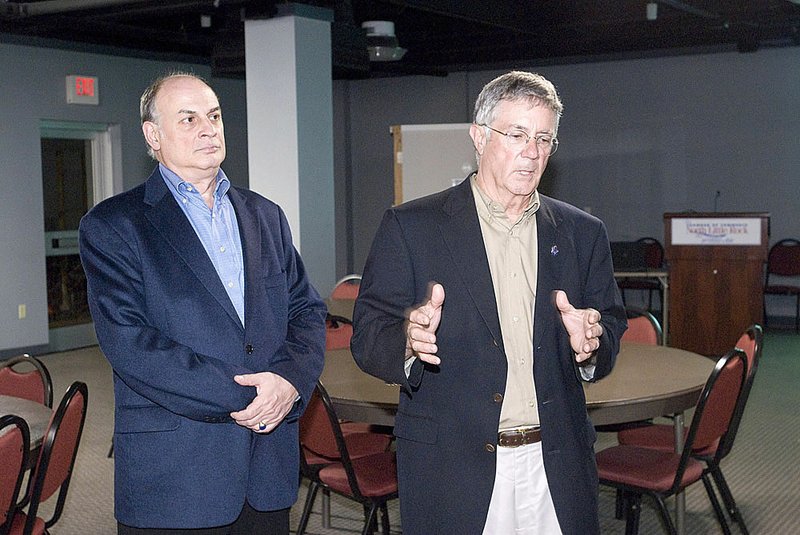LITTLE ROCK — North Little Rock voters Tuesday rejected a pair of proposed city sales-tax increases that were presented as pro-public safety but were ultimately mired in confusion over how the new revenue would be used.
The results likely also ended North Little Rock’s bid to move the State Fairgrounds from Little Rock to its eastern edge, although the fairgrounds move wasn’t officially part of the tax package.
With all precincts reporting, the unofficial totals to adopt a 0.5 percent city sales tax to be divided evenly between capital improvements and general expenditures were:
Against ............................2,758 For....................................2,522
With all precincts reporting, the unofficial totals to adopt a 0.5 percent city sales tax until March 31, 2017, for capital improvements were:
Against ........................... 2,767 For...................................2,489
Less than an hour after the polls closed at 7:30 p.m., a solemn Mayor Patrick Hays conceded the election before a handful of supporters at the North Little Rock Chamber of Commerce.
“It was a brief campaign, an intense campaign,” said Hays, who presented the tax proposal just over seven weeks ago. “We fell a little short.
“We’re committed to keep carrying this city forward. Obviously, we’re disappointed with what happened today.”
The tax was projected to provide the city an additional $15.5 million per year if both measures had passed.
Voters, however, proved reluctant to hand over more of their money to the city, despite the campaign’s emphasis on public safety.
The permanent 0.5 percent tax was to be used to build and equip a fire station on the city’s east side and buy two firetrucks, upgrade the city’s emergency communications system, replace police cars, pay for additional bed space at the Pulaski County jail, and hire 10 police officers and 13 firefighters.
The temporary 0.5 percent tax that would have lasted five years was to create a $20 million business park on the city’s eastern edge, pump $500,000 annually to each of the city’s four wards for improvements to streets, drainage and sidewalks, expand the Argenta library branch downtown and make improvements to parks.
“I’m disappointed in the failure of the measure that would have supported our police and firefighters,” said state Rep. Tracy Steele, DNorth Little Rock, who called a tax information meeting in his district last week.
“I supported that one, but I did not support the second measure,” Steele continued. “I think the second measure, not being as well-conceived as it should have been, could very well have had a negative effect on the first measure.”
With almost 5,300 votes cast, voters split almost evenly between the two measures.
Steele, however, said he wasn’t surprised that both failed because of “what I was hearing throughout the community.”
“I don’t think it was presented properly to the people in the community,” he said. “I don’t think the information was outlined on how the money was to be spent.”
Though the State Fairgrounds wasn’t mentioned in campaign literature, the North Little Rock Chamber of Commerce was working to relocate the fairgrounds to the city.
Ralph Shoptaw, general manager of the Arkansas State Fair, had said two weeks ago that the Arkansas Livestock Association was waiting on the tax vote to make a decision on whether, and where, to move.
“I talked to Ralph a little while ago,” Chamber President Terry Hartwick said as vote totals were almost all in. “He couldn’t believe it. We don’t have any land to give him. They’ll take whatever other option is available to him.”
The Arkansas Tea Party campaigned door-to-door against the tax proposal, putting out fliers while also informing people about the election being held, said spokesman Kenny Wallis.
“We are absolutely elated,” Wallis said. “I know two people who, when I provided them with information, changed their vote. A lot of people had forgotten about it, and when they had gotten our fliers, they remembered to go vote against it.”
The vote went against what many other communities in the state have done this year, even with an economy slow to recover from a recession. Sixteen sales-tax proposals have been put to a vote this year in Arkansas communities, and 14 have been approved.
Among those, voters in neighboring Little Rock passed a sales-tax increase on Sept. 13. It was Little Rock’s tax approval that prompted Hays to ask his City Council just three days later to call a special election on a sales-tax proposal.
Front Section, Pages 1 on 11/09/2011
